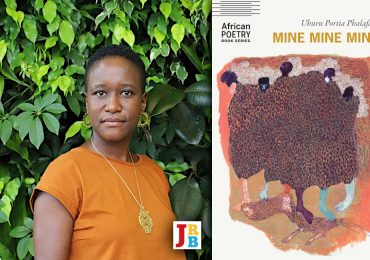The Johannesburg Review of Books presents new poetry by Mark Espin.
~~~
BROKEN SENTENCE
I
We walk the mountain’s undulating paths
while the city stirs in the mist and the smog
that stretches across the far-off range of grey-blue peaks.
The unseen birds frolic in the thick line of trees.
Their calls resonate, like the beat of my heart.
The path is covered in a layer
of brown pine stalks that crackle
as we traverse its unknown course.
The climate is silent as we signify
our intimate words amongst
the mutterings of the green leaves
that the sun momentarily anoints
with the intensity of its delicate light.
II
The morning is picturesque.
Mist rolls in from the sea,
rises up against walls.
Everything is a broken
sentence, drifting off the edge
of the world.
The woman is no longer here.
She is elsewhere; unimaginable.
There were never any possibilities
to begin with, except notions
like glitter in the recesses of the mind.
I lose my grasp of a book.
It flutters in the fall,
a broken wing. The page
I have lost, irrecoverable,
like faith.
OUTSIDE OF YOUR SHADOW
for James
I type a line for you; the beginnings of what
may become a poem. Something about your struggles
with mental incapacity. We share a joke about age
and memory, amuse ourselves further with a story
about another’s ludicrous delusions.
I now live my life by small margins.
Relish the taste of honey in blackcurrant tea,
attentively watch Roney play a trumpet solo live,
as I sit five rows back from the stage,
savour the comfort of waves unravelling,
as I stroll along a west coast beach
with you and O’Niel, feel a sense of joy
by a child’s voice over the telephone.
I measure the highs and lows by modest thresholds:
an unsolicited compliment, a slight taken resentfully,
have given up on the profound and the grandiose.
Refuse to see prospects of uprising or revolution
in the eruptions of civil unrest. Those in power
do as they please without recourse to a conscience
or to the desperate plight of the majority.
I stand outside of your shadow,
do not share the rage against injustice
that once lit up your words in flames,
made it resonate across this darkening plain.
We stand at the edge of your peculiar garden,
consider another distressing incident, a new siege nearby
where gunfire drills through the passing clouds,
pinions bodies to the wind-swept earth.
SHARP-EDGED SUNLIGHT
A storm is moving around
in the back garden. Window’s latch
is loosened, makes it shudder
against the metal frame.
After a winter of voluminous
rainfall, the winds begin again,
tethered to the horizon, out at sea,
tugging at loosened ends of branches.
For an hour or two or three,
the gale is a sonic wail, a lament
for all of those now abandoned.
Monochrome doves offer a brief
sense of redemptive harmony.
Now, there is the pursuit
of times of sharp-edged sunlight,
moments of childhood reverie
between the dull echoes of the mundane;
a holding out for the pristine ecstasies
which some places recover for you,
recollections voluptuous and embracing
in their substance, when a vivid sense
signifies longing, a leaping towards
a refuge from the past, when the turning
world paused for breath; when a circle
of eucalyptus trees, with leaves
like bright stars, called you
to its serene centre.
TAILOR’S CHALK
The sturdy chest of drawers
has been moved around the room
yet again, shifted nearer the window
this time. The current contents
removed slowly, deliberately
as thought goes to what must be changed;
whether handkerchiefs and socks
should be stored elsewhere.
Emptied now, the key for the lock
long since misplaced or vanished;
the shell, though, still carries hints
of things it retained in the past;
pungent concoction of bay rum;
small jar of menthol-infused ointment,
another aftershave lotion, pleasant
but not overpowering, just delicate
traces of citrus that have lingered.
On the discoloured base, spilled mercurochrome
or some other antiseptic which leaked
from its quaint little bottle years ago.
In the midst of these aromas, whether imagined
or real, the faint dust of soapstone flakes,
tailor’s chalk, lies fixed in the seams of wood.
Used to draw lines across cloth;
the practised skill of shaping fabric
into garments. The pair of special scissors
and t-square ruler stowed in the bottom
of the next drawer, all out of use now.
This assortment, the possessions
of my grandfather, modest implements
of his craft, cared for meticulously.
Forty years later, that morning remains present.
Late autumn May, the two lemon trees he
brought by train from Kimberley, had borne
their bitter fruit, as golden flower buds lured
fruit flies and bumble bees. In our room
we were invigorated by hot tea and daily routines.
All this disintegrated,
shattered, as something in his chest convulsed
and plunged his body back, his head
striking the wall; a dull thud that alarmed
and distressed; the sudden, unequivocal moment,
fateful seconds that reverberated, became then,
and now, the fatal instant of his passing.
A duty to reflect stays with me
for all of these years; abhorrence
of the state’s thuggery
veiled or voiced under his breath,
unlike his brother in exile, yet both driven
to realise the end of the nightmare,
each living by their own measure
of ethical injunctions.
Now, in these years of promise,
of discontent, of frustrated hopes,
I turn to the same wall each night,
seek some solace in sleep,
in dreams in which poignant
fractions of the past make me reach
back to him, forty years into the past.
© Mark Espin, 2021
- Mark Espin was born in Cape Town in 1964. He teaches in the English Department at the University of the Western Cape and lives in Athlone. These poems are from a self-published pamphlet, April in Blank Verse (2021), available at Surplus Books, 302 Albert Road, Woodstock, Cape Town.





